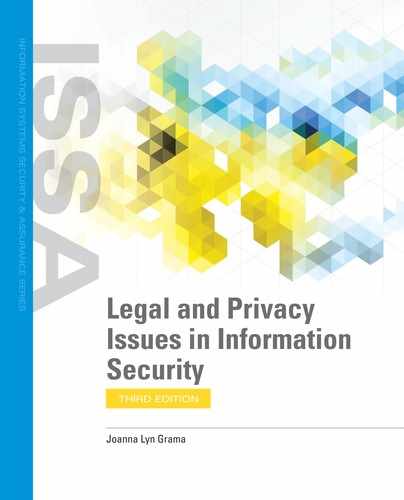Why Is Privacy an Issue?
Advances in technology are forcing people to think about how their personal data is used and shared. To give some examples:
- A chef enters her email address on a website to buy a new blender. She then begins to receive junk email from many different appliance companies.
- A school district fires an elementary school teacher after parents complain to the school principal about unprofessional pictures on the teacher’s personal web page.
- A professor gives students a homework assignment. The students must use the internet to collect as much publicly available data as possible about a particular government official.
- An organization tracks how many users visit its website each day. It records the number of times users click on links on the homepage and tracks each user’s computer Internet Protocol (IP) address. It also tracks the web page that each user was on immediately before visiting the organization’s web page.
- A person buys an MP3 player at a thrift shop. The person later discovers that the MP3 player contains files on U.S. military personnel, including their Social Security numbers (SSNs).
Advances in technology change how people live. For example, the discovery of electricity led to huge societal advances. Today, electrical service is a utility that many take for granted. The creation of the telephone allowed people to communicate over greater distances. Today, it seems unusual to find an adult who does not carry a smartphone that provides both voice and data services.
The rise in internet use also has the potential to change how people live. According to U.S. Census Bureau data, it is estimated that over 88 percent of U.S. households had internet access in 2018.1 You can expect that number to continue to grow.
People use the internet for almost everything: learning, entertainment, and work. You can search the internet for almost any type of data. (In fact, almost every endnote in this book contains a reference to a website.) The internet is also used as a forum for sharing all types of information nearly instantaneously. The internet allows media companies to report on world events immediately. Anyone can publish anything to the world with just the click of a mouse.
However, the rise of the internet has led to some privacy concerns:
- Increased access to information
- Increased amount of information
- Electronic tracking and monitoring
This increased access to information has some complications. For example, anyone in the world can view information published on the internet. Therefore, even enemies of the government can view government information posted online. People can copy and use articles posted to the internet without the author’s permission. Blogs and pictures that appear on personal web pages for family and friends to view are sometimes available to anyone, anywhere.
The amount of information on the internet is also a concern. Larger and more complex information systems allow businesses and governments to collect more and more individual data, which has led to the concept of Big Data. Big Data refers to large and complex data collections. Sophisticated applications review and analyze data collected from many sources. The owners of these systems can accumulate large amounts of data about people, which they can use for their own purposes. For example, they can create highly detailed individual profiles by combining their data with that of other systems. They also can sell the data they collect to third parties. Privacy issues are challenged by Big Data collections because the collections contain vast amounts of information from many different sources.
![]() NOTE
NOTE
A search engine is a program that retrieves files and data from a computer network. You use a search engine to search the internet for information. Google, the most used internet search engine, has become so popular that “to google”—meaning to search the internet for information—was added to the Oxford English Dictionary in June 2006.2
People leave electronic footprints in many places on the internet. Internet service providers (ISPs) maintain logs that track performance information. Websites track the actions of visitors to the site, and organizations may track and record the internet and email activities of employees. Service providers of all types back up their logs and data for disaster recovery purposes. These backups contain personal information. Many people do not know that their activities are recorded, stored, and monitored in so many different ways.
Electronic tracking and monitoring also create privacy concerns. Many people believe that they are anonymous on the internet and that when they surf the internet or post information their actions are private. They are not.
![]() NOTE
NOTE
A blog is a personal, online journal. The word “blog” comes from the words web and log. A blog author uses this online journal to publish comments and personal observations.
Most people want certain types of data kept secret. They believe that if they must share their data, they should at least be able to control how the data is subsequently used. These beliefs form part of the basis of the concept of privacy.
